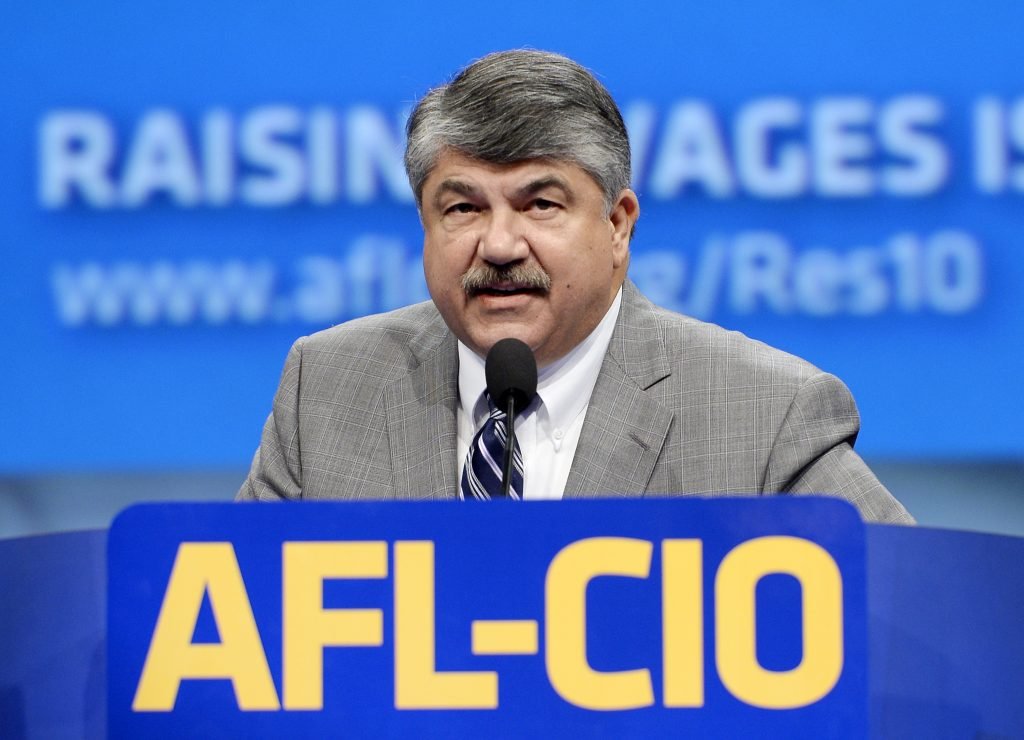
The phrase “Clear it with Sidney” was made famous by President Franklin Roosevelt. The Sidney in question was Sidney Hillman, president of a garment worker union and a founder of the Congress of Industrial Organizations (CIO). The phrase underlined Roosevelt’s desire for Hillman’s sign-off on key policy initiatives and political appointments. The updated version for House Democrats is “Clear it with Trumka,” the president of the AFL-CIO.
In the negotiations between the Trump administration and the
House Democratic majority to achieve a favorable House vote on the United States
– Mexico – Canada Agreement (USMCA), AFL-CIO president Richard Trumka has
exerted increasing demands and pressure on the House Democratic leadership.
While there are a number of issues (pharmaceutical patent terms, environmental
language, and others) that need to be worked out before the Democrats will
agree to ratify the USMCA, labor rights enforcement by Mexico has been the
major sticking point — and the determined focus of the AFL-CIO.
Despite venomous relations between the Trump administration
and House Democrats, US Trade Representative Robert Lighthizer has maintained a
close and trusting negotiating framework with House Democratic leaders,
including Speaker Nancy Pelosi (D-CA) and House Ways and Means Committee
Chairman Richard Neal (D-MA). Pelosi established a USMCA Working Group of House
Democrats to negotiate Democratic demands for changes in the USMCA (either
through side letters or other means). During the summer and throughout the
fall, Lighthizer met frequently with the group, and with Pelosi, to attempt to
reach common agreement on exact wording for the legislation implementing
legislation for the USMCA.
The hope originally was for conclusion by early fall 2019. That didn’t happen, but throughout the fall, both sides expressed optimism that a deal could be reached. At the end of October, Pelosi stated that she was “optimistic” that they were on a “path to yes” and that a deal could come soon. And Rep. Neal stated that Lighthizer and the working group were “firming up” language on the labor provisions.

Enter Richard Trumka. Beginning in October and continuing more insistently in recent weeks, the labor leader has called for negotiations to slow down. He specifically warned several weeks ago that labor would work to defeat the agreement if it were brought up before the Thanksgiving recess. Trumka has called for stronger enforcement provisions in the labor chapter, aiming for a highly intrusive second-guessing of Mexico’s labor regulators and the possibility of tariff snapbacks if the US finds Mexico failing to comply with USMCA mandates. Mexico has warned that it will not accept any infringement on its sovereignty.
On Thursday, November 21, Speaker Pelosi suddenly cast doubt on the ability of the House to move before the end of the year, citing technical challenges in the mandated approval process. In typical fashion, President Trump jumped the gun and declared USMCA “dead,” proclaiming that Trumka had played Pelosi “like a fiddle.” By Monday, November 25, cooler heads had prevailed: Pelosi reiterated her belief that the trade deal was “within range,” and negotiations on precise language continued.
(Conventional wisdom has it that USMCA ratification must be
concluded before the presidential election year, 2020. But given political
will, this is not necessarily so, as there is great flexibility in the
congressional rules if House and Senate leaders agree.)
Here are tradeoffs and bottom lines for Democrats and labor.
For Pelosi there are three strong reasons to pass USMCA: First, Democrats know
that — despite bad press — USMCA is a solid economic advance, backed strongly
by both Mexico and Canada; Second, Democrats want to demonstrate that, despite
the vitriol of impeachment, they can gets substantive results; and third, a
number of moderate Democrats, particularly new members from former Republican
districts, are clamoring for a positive result on trade. However, Pelosi also cannot
afford a public break with the AFL-CIO.
Trumka’s endgame still unclear. At the furthest reach, labor
may have decided drag out the process, and hope for a better deal with a Democratic
president in 2021. More likely, Trumka is counting on time pressures to force the
administration and Mexico to come closer to labor’s demands.
In any case, the mantra “Clear it with Trumka” still obtains.
The post Trade, Democrats, and labor unions: ‘Clear it with Sidney’ appeared first on American Enterprise Institute – AEI.
